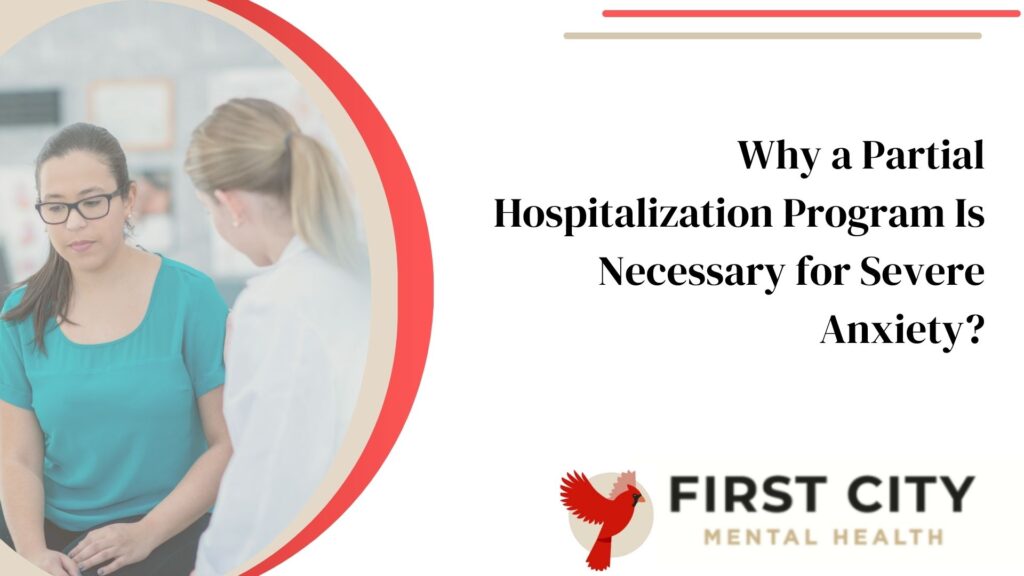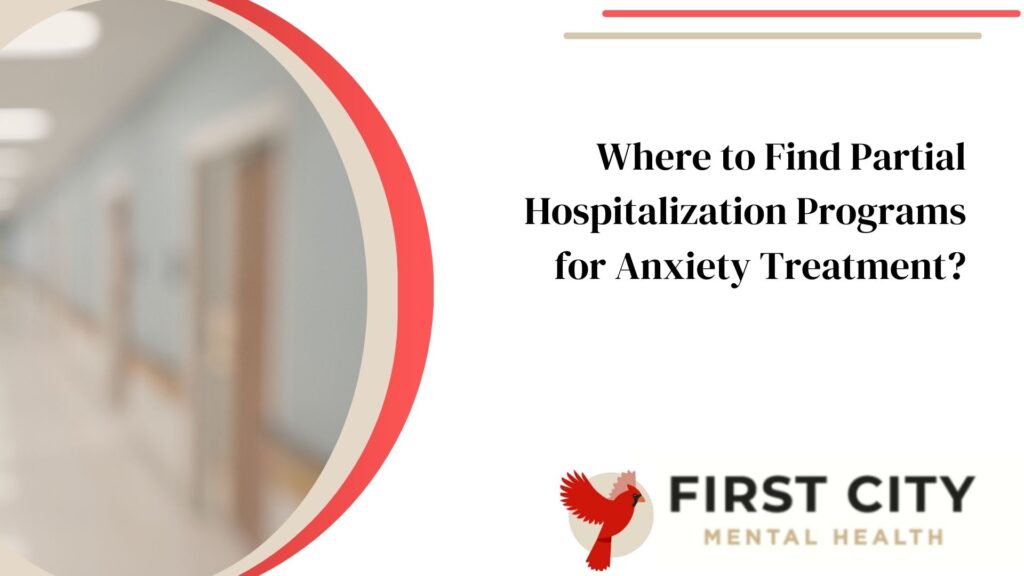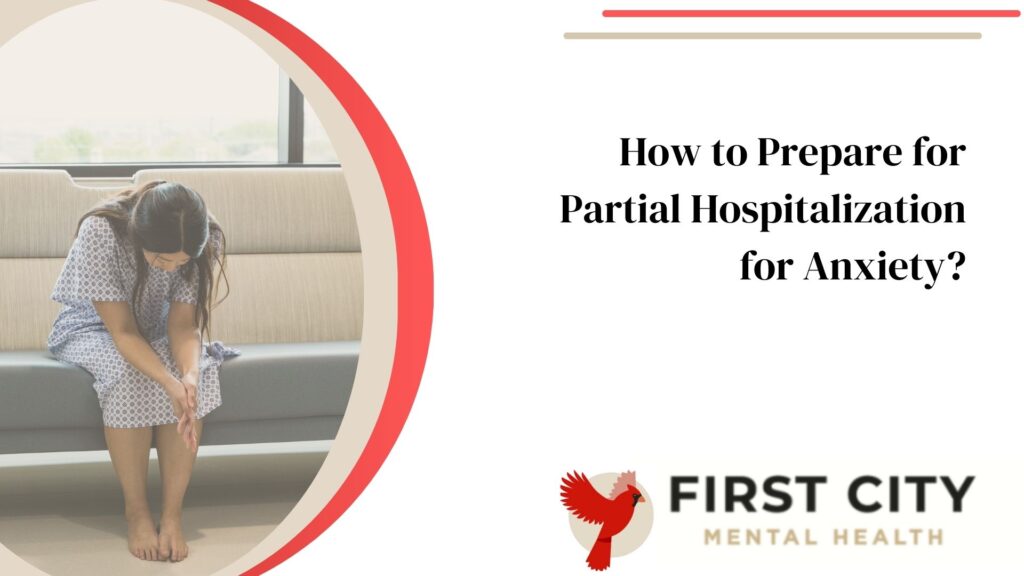
How Much Does an Intensive Outpatient Program Cost in Indianapolis?
September 4, 2025
How an Intensive Outpatient Program in Indianapolis Work?
September 11, 2025Struggling with anxiety can make daily life feel overwhelming. A Partial Hospitalization Program (PHP) might be what you need if your anxiety symptoms are severe but do not require 24-hour hospital care.
This article will explain when such a program is necessary and how it can help you or a loved one manage anxiety more effectively. Keep reading to learn more about this crucial mental health treatment option.
Key Takeaways
- Intensive Care Without Overnight Stay: Partial hospitalization programs (PHPs) provide structured daytime treatment for severe anxiety, allowing patients to return home in the evening.
- Personalized Treatment Plans: PHPs offer individualized care through therapy sessions, medication management, and skill-building activities supervised by mental health professionals.
- Eligibility Through Assessment: Admissions involve thorough evaluations to determine if a patient’s anxiety severity qualifies them for a PHP, ensuring appropriate levels of care.
What Is the Role of Partial Hospitalization in Treating Anxiety?
Partial hospitalization programs (PHPs) serve as a bridge between inpatient hospitalization and outpatient care, providing more intensive treatment for those with significant anxiety disorders.
These programs highlights offer structured psychiatric care without the need for patients to stay overnight. Participants attend therapy sessions during the day but can return home in the evening.
This structure allows adult patients to maintain daily functioning while receiving comprehensive mental health care.
The role of PHPs extends beyond just therapy; they include medication management and various forms of support like group therapy and dialectical behavioral therapy (DBT). Psychiatric Nurse practitioners emphasize that this combination addresses both emotional and physical aspects of anxiety, making it an effective option for intense treatment needs.
Adult partial hospitalization programs typically involve a multidisciplinary treatment team working together to meet individual needs through personalized treatment goals.
Aside from offering flexibility compared to full hospital stays, PHPs enable patients to apply coping skills learned in sessions directly within their living environments while still benefiting from professional guidance throughout the week, excluding holidays.
If you want to know more about how partial hospitalization in Kokomo works, give us a call!
Why a Partial Hospitalization Program Is Necessary for Severe Anxiety?

A Partial Hospitalization Program (PHP) serves as a vital treatment program for those grappling with severe anxiety. Severe anxiety can hamper one’s ability to attend school, work, or maintain relationships.
The PHP provides an intensive level of care while allowing individuals to return home at the end of the treatment day. This structured environment focuses on critical needs through therapy sessions, medication management, and skill-building activities supervised by mental health professionals.
Individuals participating in a PHP benefit from personalized attention without the restrictions of inpatient hospitalization. These programs include group therapy, individual counseling, and psychoeducation tailored to each patient’s specific mental health concerns.
With insurance coverage often available for such programs under Medicare and private policies, patients can access necessary care without overwhelming out-of-pocket costs.
What to Expect from a Partial Hospitalization Program for Anxiety?
Mental Health Partial Hospitalization Program (PHP) provides structured treatment plans for individuals dealing with severe anxiety. Understanding what to expect can help patients and their families prepare for this intensive form of care.
- Assessment and Admission: Admissions Coordinator often spearheads initial assessments. Patients undergo thorough evaluations to determine their eligibility based on certain requirements set by the treatment center.
- Structured Daily Schedules: PHPs offer a well-organized daily schedule that includes multiple therapy sessions, group activities, and social skills training to help manage anxiety symptoms effectively.
- Therapy Sessions: Patients participate in individual counseling sessions with a licensed therapist. These sessions often focus on cognitive-behavioral techniques to address specific anxiety triggers.
- Group Activities: Group therapy is a key component of PHPs. It allows patients to share experiences and strategies, building a supportive community that fosters healing and growth.
- Medication Management: Psychiatrists manage psychiatric medications as part of the program. Adjustments are made as needed to ensure optimal results.
- Family Involvement: Some programs encourage family participation through family therapy sessions or informational meetings, which aid in creating a support system outside the treatment center.
- Skills Training Workshops: Workshops focus on teaching coping mechanisms and life skills to handle day-to-day stressors that contribute to anxiety.
- Insurance Navigation Assistance: Many programs assist with navigating insurance company policies and out-of-pocket costs involved in treatment, making it easier for patients to access necessary care without financial strain.
- Referral Process: Health providers may refer patients to PHPs if they deem outpatient therapy inadequate for managing severe anxiety symptoms effectively.
- Follow-up Care Plans: Upon completion of the program, patients receive detailed follow-up care plans tailored to continue their progress post-PHP participation.
Where to Find Partial Hospitalization Programs for Anxiety Treatment?

First City Recovery offers highly-regarded PHPs specifically designed for anxiety treatment. We provide comprehensive services under the supervision of experienced professionals.
Contacting our Partial Hospitalization program mental health directly can offer information on out-of-pocket costs and other necessary details before enrollment.
Having a reliable support system through efficient partial hospitalization can significantly improve one’s journey towards managing anxiety.
How do Partial Hospitalization Programs Help Manage Anxiety Symptoms?
Partial hospitalization programs (PHP) provide structured support for individuals experiencing severe anxiety symptoms. They offer an intensive treatment environment where patients attend therapy sessions during the day but return home at night.
PHPs typically include a combination of individual and group therapy, medication management, and educational workshops designed to equip patients with coping skills. By receiving daily therapeutic interventions, participants can better manage their anxiety symptoms through specialized strategies like cognitive-behavioral therapy (CBT).
This approach helps in identifying negative thought patterns and replacing them with positive behaviors.
Kevin Metz, Admissions Coordinator at First City Mental Health Center since 2013, emphasizes that PHPs also focus on building resilience by teaching relaxation techniques and mindfulness practices.
These methods aim to reduce stress levels effectively. Patients learn how to practice deep breathing exercises or engage in guided imagery to calm their minds when anxiety strikes.
Additionally, daily interaction with therapists provides immediate feedback and adjustments tailored to each individual’s needs. The comprehensive care model ensures that clients receive multiple layers of support without the need for inpatient hospitalization while managing out-of-pocket costs efficiently.
What Types of Anxiety Disorders Benefit from Partial Hospitalization?
Generalized anxiety disorder (GAD) often benefits from partial hospitalization programs (PHP). People with GAD experience excessive worry about various aspects of life, making daily functioning difficult.
Indiana Partial Hospitalization Program provides structured support while allowing patients to live at home, receiving intensive therapy during the day.
Panic disorder is another type that sees improvement through PHP. Individuals suffer sudden and intense panic attacks, which can be debilitating. A partial hospitalization program offers a controlled environment for managing these episodes and teaches coping strategies.
Social anxiety disorder also gains significant advantages from PHP services by helping individuals navigate social interactions without overwhelming fear.
How to Access Partial Hospitalization Programs for Anxiety?
Transitioning from understanding the types of anxiety disorders that benefit from partial hospitalization, one must know how to access these programs. Several steps can guide you through this process effectively.
- Consult with Your Physician: Physicians often serve as the first point of contact. They can evaluate your symptoms and determine if a Partial Hospitalization Program (PHP) is necessary.
- Get a Referral: Many PHPs require a physician’s referral for admission. This helps ensure that you receive the appropriate level of care based on professional medical advice.
- Check Insurance Coverage: Contact your insurance provider to verify if they cover PHPs for anxiety treatment. Understanding out-of-pocket costs beforehand prevents financial surprises.
- Research Accredited Facilities: Look for accredited facilities specializing in anxiety treatment. Accreditation assures quality care and adherence to established standards.
- Contact Program Administrators: Reach out to program administrators like Rebekka Carmack at First City Recovery. They can provide detailed information about program specifics and admission criteria.
- Evaluate Program Suitability: Assess whether the programs offer services tailored to your specific needs, such as cognitive-behavioral therapy or medication management for severe anxiety.
- Schedule an Assessment InterviewMost PHPs conduct initial assessment interviews to understand your condition better and determine eligibility.
- Gather Required Documentation: Programs may require medical histories, previous treatment records, and insurance details during the application process.
- Review Financial Plans and Options: Discuss available payment plans with the facility’s administrative assistant or financial counselor if facing high out-of-pocket costs.
- Prepare Mentally and Logistically: Organize necessary logistical aspects such as transport and daily schedules while preparing yourself mentally for structured treatment sessions ahead.
Following these steps helps ensure seamless access to a Partial Hospitalization Program PHP designed specifically for managing severe anxiety symptoms effectively.
How to Prepare for Partial Hospitalization for Anxiety?

Preparing for a Partial Hospitalization Program (PHP) for anxiety can ensure a smoother transition into treatment. Here is a detailed guide to help you get ready:
- Complete Pre-Admission Assessments
- Nathan White, a recovery liaison, emphasizes the importance of these assessments.
- They help determine the severity of your anxiety and tailor the treatment plan.
- Pack Necessary Personal Items
- Ensure to bring comfortable clothing.
- Don’t forget personal hygiene products and any prescribed medications.
- Inform Your Employer
- Contact your supervisor or HR department about your upcoming absence.
- Sherry Waymire, an EAP liaison, suggests providing them with the necessary documentation.
- Arrange Transportation
- Plan how you will commute to and from the hospital.
- Confirm availability of parking or public transit options if needed.
- Understand Out-of-Pocket Costs
- Consult with your insurance provider about coverage details.
- Consider any co-pays or additional expenses you may incur during your stay.
- Set Personal Goals
- Reflect on what you want to achieve through this program.
- Discuss these goals with your healthcare provider for better alignment in treatment.
- Create a Support System
- Inform close friends or family members about your participation in PHP.
- Establish regular check-ins with them to share progress and receive encouragement.
- Prepare Mentally and Emotionally
- Engage in mindfulness practices such as meditation or journaling.
- Acknowledge that seeking intensive help is a positive step towards recovery.
Adequate preparation can significantly enhance the effectiveness of your Partial Hospitalization Program in Indiana for anxiety, setting you on a path toward better mental health outcomes.
Conclusion
A Partial Hospitalization Program for anxiety provides intensive treatment without the need for 24-hour hospital care. This program suits individuals with severe anxiety or those transitioning from inpatient care.
It includes structured therapy, medication management, and support from a multidisciplinary team of healthcare professionals.
FAQs
1. What is a Partial Hospitalization Program (PHP) for anxiety?
A Partial Hospitalization Program (PHP) for anxiety is an intensive treatment option that provides structured care without requiring overnight stays.
2. When should someone consider a PHP for anxiety?
Consider a PHP when regular outpatient therapy isn’t enough to manage symptoms or when you need more support but don’t require full hospitalization.
3. Are there out-of-pocket costs associated with PHPs?
Yes, there can be out-of-pocket costs depending on your insurance plan and coverage details.
4. How does a PHP help with severe anxiety?
A PHP offers comprehensive treatment, including therapy sessions, medication management, and coping strategies to address severe anxiety effectively.






